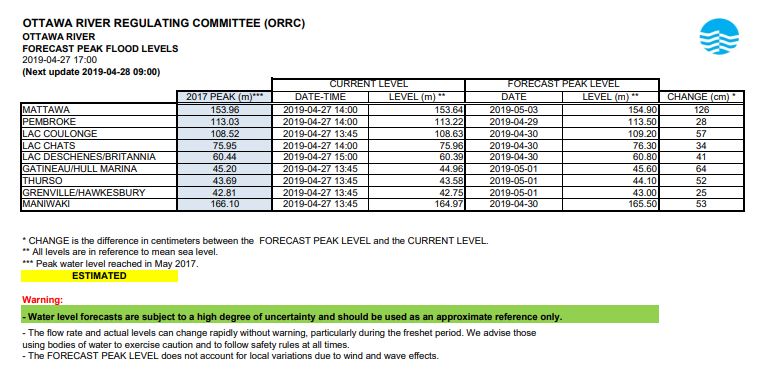Eighteen households in Ottawa have voluntarily evacuated their homes as the city continues to respond to flooding caused by rising water levels along the Ottawa River, an emergency operation that officials say could last “multiple weeks.”

That news came just before Public Services and Procurement Canada announced Saturday evening that it’s closing the Chaudière Bridge — which crosses over the river, linking Ottawa and Hull — as of 6 a.m. on Sunday because of “forecasted high water levels and flows.”
Ottawa has been under a state of emergency since Thursday, with forecasts predicting the river levels early next week will well surpass the peak of the floods in 2017.

More than 4,000 volunteers have signed up to help with sandbagging operations and other flood relief efforts so far, according to Ottawa city manager Steve Kanellakos — but he warned that the city will need people to sustain that “tremendous show of support” over the coming weeks.
“It just doesn’t end when the water peaks. The real work will begin after the water peaks,” Kanellakos said during an update at city hall on Saturday afternoon.
“The most difficult time will be for our residents then.”
Volunteers, city crews and military members on Saturday continued to fill, haul and install sandbags around at-risk properties in flood zones by the Ottawa River. The most hard-hit communities are Constance Bay and Fitzroy Harbour, in Ottawa’s rural west end; Britannia, west of the downtown core; and Cumberland, in the city’s east end.
“This is a really difficult time for our communities but the city is pulling together,” deputy mayor George Darouze told reporters.

Get daily National news
With the recent rainfall and melting snow, the river levels began rising “much faster than expected,” city staff said in their update on Friday. Because of that, city crews started advising residents in the most imminently threatened homes about an evacuation plan.
WATCH: Ottawa Public Health offers tips during flooding emergency

As of 4 p.m. on Saturday, Kanellakos said four of the 18 evacuated homes are located in Cumberland and the rest in Constance Bay. Over in Gatineau, the municipality said on Sunday morning that 1,212 people flood victims, representing 575 homes, have registered with the city.
The Chaudière crossing will remain closed to traffic “until the water recedes to a level where the bridge is safe for inspections and use,” the federal government said in a news release. Vehicles and pedestrians on both sides of the river will be redirected to the Portage interprovincial bridge in the meantime.
550 military members now in Ottawa
Just over 550 army personnel are on the ground now in Ottawa, according to municipal and Canadian Armed Forces officials.
Out of those troops helping with flood relief efforts, 220 are in Constance Bay, 60 to 70 are in Britannia and 30 are in Cumberland, according to Col. Jason Adair. The rest are “supporting soldiers” stationed at the Connaught Range.
For the most part, the city determines where soldiers should be sent, Adair said.
On top of that, about 100 reservists are being rerouted from a training exercise in London to go help out in Ottawa.
Kanellakos said the city is “grateful” for the military’s support, and thanked the federal government for moving “quickly” to deploy troops after the city called for help on Thursday.
Affected residents and volunteers told him they experienced a “morale boost” after the army’s arrival, the city manager said.
No power shut-offs yet, crews protecting road near water treatment plant: city
No one’s electricity has yet been cut off due to the floods, although the city has completed “one-off” shutdowns in recent days, according to Anthony Di Monte, the city’s general manager of emergency and protective services.
However, that situation could soon charge, he indicated, adding that safety authorities and Hydro One have started to assess some areas, particularly in Cumberland.
“We’re beginning to see, in some areas, water levels getting dangerously high,” Di Monte said. “We’re starting to approach that in certain areas and that’s going to be become the next evolution of difficult decisions that’ll have to be made.”
In a press release on Friday, Hydro One said it urges customers affected by flooding across Ontario to contact the utility if rising waters are threatening their homes. Both Hydro One and Hydro Ottawa say they will waive fees for emergency disconnections related to the floods.
City of Ottawa staff said crews are also keeping an eye on the water levels near the water treatment plant in Britannia. Officials said “proactive measures” have been taken to protect the road leading to the plant and that water quality in Ottawa continues to be “unaffected” by the flood.
However, if you rely on a private well for drinking water and flood waters have covered the wellhead, steer clear, a spokesperson for Ottawa Public Health urged. That water is almost certainly contaminated, so boil it or grab water bottles at a nearby community support centre, the spokesperson said.
Forecast for flood peaks in Britannia, Gatineau lowered by 10cm but water still rising
The latest forecast from the Ottawa River Regulating Planning Board predicts the water levels will now peak at 60.80 metres on Tuesday in Britannia, and at 45.60 metres on Wednesday in Gatineau/Hull Marina — 10 centimetres lower than earlier forecasts indicated.
However, the committee that publishes the data warns that water level forecasts are “subject to a high degree of uncertainty” and suggests they be used “as an approximate reference only.”

As of Saturday afternoon, the river measured 60.39 metres high in Britannia, just five centimetres shy of the 2017 peak. The water levels in that area are therefore expected to rise another 41 centimetres before their expected peak on Tuesday, according to the latest forecast.
In Gatineau, the water levels measured 44.96 metres on Saturday afternoon — compared to the 2017 peak of 45.20 metres — and are forecasted to increase another 64 centimetres by Wednesday.









Comments